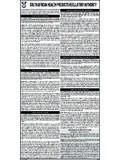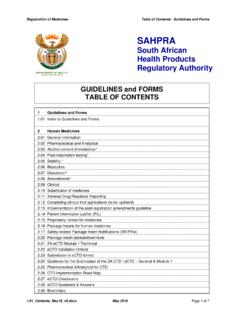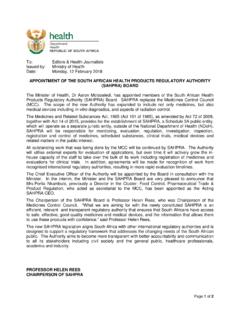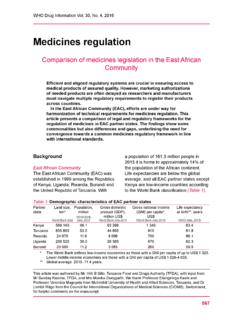Transcription of POLICY ON MANAGEMENT OF POTENTIAL …
1 MEDICINES control COUNCIL POLICY ON MANAGEMENT OF POTENTIAL CONFLICT OF INTEREST NOVEMBER 2011 1 INTRODUCTION Section 6(4) of the Medicines and Related Substances Act 101 of 1965, The Medicines Act states as follows: A member of the Medicines control Council or of a committee appointed in terms of section 9 shall declare his or her commercial interests related to the pharmaceutical or health care industry, which interests shall include, but shall not be limited to, any consultancy, paid or unpaid, any research grant from which the member directly or indirectly benefits, or any equity holding or any executive or non-executive directorship or any other payment or benefit in kind, and shall recuse himself or herself from any discussion or decision-making to which the said interests relate or may relate.
2 The MCC is responsible for scientific evaluation of medicinal products and related substances for human and veterinary use. The MCC also regulates the conduct of clinical trials and licences manufacturers, wholesalers and distributors of medicines. The MCC also advises the Minister on the classification of medicines and their control . The MCC has a significant impact on the protection and promotion of human and animal health. The MCC may, acting in terms of section 9 (1) (b) of the Medicines Act and subject to the approval of the Minister appoint expert committees and working groups to assist it in its work. Once these bodies have been established, the MCC acting in terms of section 9(3) of the Medicines Act, may appoint their members.
3 Integrity and high standards of professional conduct by all involved in the work of the MCC (such as members, expert committee members, sub-committees, working groups, expert consultants and secretarial support) are critical to maintain the independence of the MCC and its reputation. Members of the MCC and its expert committees have been appointed on the basis of their expertise such as the assessment of medicinal products for human and animal use and their legal expertise as well as their integrity to provide advice in the public interest. Owing to their skills, expertise and experience as well as the nature and mandates of their institutions of primary employment, it is possible that members of the MCC and its expert committees have, or may have had some association with the pharmaceutical or health care industry.
4 Conflict_of_Interest_Nov11_v1_1 Page 1 of 8 1 Introduction - continued Conflict of interest policies are designed to protect the integrity of decision-making processes through disclosure, transparency and where appropriate, recusal (or in exceptional circumstances, exclusion). As the MCC must ensure that decisions are taken and perceived to be taken solely on the basis of evidence and in the public interest, such a POLICY is clearly required. 2 SCOPE The POLICY applies to: Members of Council The Chairpersons of Expert Technical Committees appointed by the MCC including ad hoc members and members of any working groups and/ or task teams that the MCC may, from time to time, establish and Members of the secretariat who by virtue of their support functions are involved in the work of the MCC and its structures.
5 3 DEFINITIONS Unless the context indicates otherwise, the following words and phrases used in this document have the following meanings: Company means business that is involved with medicines or acts as an applicant Healthcare industry means businesses that are involved in health care and includes Clinical Research organisations Pharmaceutical industry means companies, partnerships or individuals who are involved with the manufacture, sale or supply of medicines as defined in the Medicines Act as well as trade associations representing such companies, partnerships or individuals. Professional organisations refers to colleges, health professional associations and societies, universities, research institutions, Affected person means any person to whom this POLICY applies secretariat refers to employees of the National Department of Health (NDoH) who provide technical or administrative support to the MCC and its structures.
6 Direct interest in a company includes, but is not limited to: Employment with a company Consultancy with a company Strategic advisory role for a company Financial interests in a company, including but not limited to: o The holding of shares or bonds, (except share holdings through general mutual funds or similar arrangements where the person holding interest has no control over the selection of shares). o Compensation, fees, honoraria and /or salaries paid directly to an individual by the relevant company; and, o Reimbursement by the relevant company of expenses associated with conference or meeting attendance ( accommodation and travel costs) Conflict_of_Interest_Nov11_v1_1 Page 2 of 8 3 Definitions - continued A proprietary interest in a substance, technology or process Expert witness in a court of law in a case involving the relevant company Employment, consultancy, directorship, or any other work completed or position held during the past five years, whether or not paid, in or for any commercial entity which has an interest in the subject matter of the meeting or area of work, or an ongoing negotiation concerning prospective employment or other association with the commercial entity Payment or other financial support covering any period within the past five years.
7 Or an expectation of financial support for the future, from a commercial entity with an interest in the subject matter of the relevant meeting or area of work, including but not limited to grants, fellowships and the financing of posts Access to classified or proprietary information concerning or relevant to the subject matter of the relevant meeting or area of work; and Direct involvement in the development of a medicine that is the subject matter of the relevant meeting or area of work. Indirect interest in a company includes but is not limited to:-: o Principal investigator in a clinical trial of relevance to the MCC s or Expert Committee s mandate o Investigator in a clinical trial of relevance to the MCC s or Expert Committee s mandate o Individual s institution receives a grant or other funding from a pharmaceutical company ( sponsoring of a research chair at a university department or an organization receives funding for research work and the individual is employed by such an organization, is a volunteer or representative of such organization and receives no personal gain).
8 O Involvement in research work for a company o Family interests, in which a spouse, child, parent sibling or other close relative if the latter resides in the same household as the member, employed (or applies for employment) by a party that may have an interest in the subject matter of the meeting or work of relevance to the MCC s or Expert Committee s mandate. 4 PURPOSE Conflict of interest policies are designed to protect the integrity of decision-making processes through disclosure and transparency and, where appropriate, recusal. 5 PRINCIPLES OF THE POLICY Robustness Direct versus indirect interest a. The focus is more on direct interests leading to the highest risk level and resulting in restricted involvement in the Council s activities.
9 B. Indirect interests leading to an intermediate risk level with mitigating strategies to balance limiting involvement in the council s activities and accessing the best expertise on a particular scientific matter. Conflict_of_Interest_Nov11_v1_1 Page 3 of 8 Efficiency Conflicts of interest are categorised into three groups namely: direct interests, indirect interests and no interests. Direct interests are assigned the highest risk level (level 3), indirect interests an intermediate risk level (level 2) and no interests the lowest risk level (level 1). Transparency A record shall be kept at the NDoH of: a. Names of affected who have declared interests on appointment, as the interest first arises and/or through the annual declarations well as the nature of the interest; b.
10 Names of affected persons who have declared interests at meetings giving dates, names of relevant medicines and companies, details of the interest declared and whether the member took part in the proceedings. c. The level of interest of each affected person. d. The list of MCC members, expert committee members and secretariat shall be published on the MCC website. 6 DECLARATION OF INTERESTS Each affected person shall before or at the first MCC or committee meeting he or she attends each year of the period of tenure of such member submit to that body s chairperson, a list of his or her direct and indirect interests, in companies in the pharmaceutical or health care industries. The Chairperson and an evaluation advisory group nominated by the MCC shall determine whether such conflict: a.












